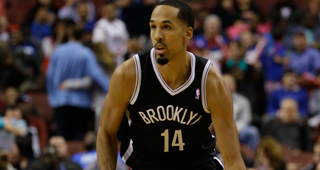While Jason Kidd’s spilled drink epitomized the start of his tenure as head coach of the Brooklyn Nets, he now has the team hitting on all cylinders and climbing up the standings in the Eastern Conference. One benefit of a long and stressful 82-game regular season is that it gives teams the opportunity to turn things around, especially for a team like the Nets who went into the New Year as a disappointing 10-21 team.
“Our goal is to try to win the Atlantic,” Kidd told ESPN New York 98.7. “And we still believe that we can do that. Again, Toronto is playing extremely well and it’s not going to be easy but we take one game at a time and if we take care of our business, then maybe we put ourselves in a position to win the Atlantic and that’s something we feel we can do.”
After moving Paul Pierce to the power forward position on January 1, the Nets have been streaking with a 26-10 record—including 11 straight wins at Barclays Center. They currently sit as the fifth seed in the Eastern Conference, 2.5 games behind the Raptors for first place in the Atlantic Division.
The Nets have abandoned much of their halfcourt sets in favor of a more up-tempo pace after Brook Lopez suffered a season ending foot injury. The loss of Lopez’s 25.6 PER and 20.7 PPG has hurt the teams’ offensive output, but it has opened doors for other players to contribute.
Mason Plumlee injects frontcourt athleticism that the Nets have dearly lacked much of the season. Watching Kidd’s rookie season as coach, we can see that he wants his team to push the ball and run as much as possible, similar to Kidd’s own style of play.
Without creating turnovers, there would be no way any team would be able to generate a significant amount of points in transition. The Nets are currently tied for fourth in the league for steals per game at 8.6. Much of this can be attributed to backup point guard Shawn Livingston. Livingston ranks third in minutes played on the team, and has only missed one game all season. His long 6’11” wingspan allows him to switch effortlessly between defending guards and forwards, often creating steals that lead to easy transaction baskets for the Nets. When Livingston is on the court, the Nets allow a tough 97.3 points per 100 possessions since January 1; when Livingston is on the bench, the Nets give up 105.8 points per 100 possessions.
John Schuhmann—one of the best advanced stats writers in the business—describes Livingston perfectly: “A 6-foot-7 point guard with a 6-foot-11 wingspan, Livingston is the embodiment of Brooklyn’s new identity.”
With the lingering back issues for Kevin Garnett, Plumlee has been getting the minutes in the frontcourt starting the past ten games in Garnett’s absence. The Nets have scored an impressive 16.7% of their points off the fastbreak and 27.1 percent of opponent turnovers with Plumlee as a starter, compared to 10 percent and 16.4 percent respectively while Lopez was in the lineup.
After Plumlee was inserted into the starting lineup, Deron Williams has started to come on. In another injury-ridden season thanks to his ankles, Williams has had the worse statistical season since his rookie year. However, with the Nets running more on transaction, Williams is starting to round into form. So far in March—10 games in—he has averaged 17.2 PPG with 6 assists along with an impressive 48 percent shooting.
The presence of Jason Collins has provided the team with a consistent staple of locker room chemistry. While Collins averages less than 10 minutes per game, the Nets still agreed to terms to sign him for the rest of the year. This illustrates how much the Nets value Collins as a locker room presence, as well as his vocal leadership on defense.
With 16 games left in the season, only four of those are against teams above .500. As long as the core group of Nets remains healthy going into the playoffs, they will certainly be a tough out in the playoffs against any team. Contrasting from last year’s lifeless team that was eliminated by the Bulls, the Nets have playoff-tested veterans like Pierce, Kirilenko and Garnett. No one player on the team has averaged more than 16 points per since January 1. Kidd has finally found his niche to be a successful NBA coach—playing unselfish basketball just as he did as a player.


